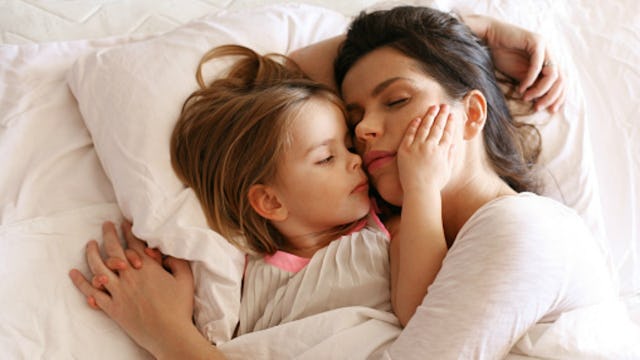I Worry Postpartum Depression Prevented Me From Being A Good Mom

I had plans to be the most attentive, amazing mother. I put so much thought into my daughter’s impending birth. I carefully selected each piece in her nursery, her wardrobe, and the items I would use to care for her. Not a single detail was overlooked. I wanted everything to be perfect for her. I wanted to be perfect for her.
I wasn’t sure what to expect as a first-time mom, but who does? It’s one of those things you have to experience firsthand to truly understand. I expected the emotional rollercoaster of the “baby blues” immediately following her birth. I knew there would be sleeplessness and exhaustion, but postpartum depression and anxiety never crossed my mind. It just wasn’t on my radar—at all.
I cried the week before her arrival while blaring P!nk’s Perfect in my car. I felt those lyrics in my soul. I wanted so badly to be her soft place to land, no matter how dark and cruel the world was. And then she was here. She was, and still is, the most precious, perfect little being. I would die twice to keep her safe, but when I think back to the weeks and months following her arrival, I can’t help but feel like I let her down.
Shortly after her birth I was blindsided by postpartum depression and anxiety. It’s easy to see how bad it was from this vantage point, six years later. But at the time, I didn’t see it. I knew something was off, but I thought it was just the jitters that came with being a first-time mom.
It wasn’t.
My mind told me that if I wasn’t physically with my daughter something awful would happen. I was scared to leave her side. I cringed when others held her, for fear they may drop her. I worried if I carried her into the kitchen I might accidently burn her leg on the stove. It was all I could do to keep myself together, to keep my head above water. I felt like a failure.
Anxiety consumed my days, and kept me awake at night. It led me into a depression I never saw coming. I was lost.
When I had my son two years later, things were different. I was fortunate to be spared the debilitating anxiety this time around, and the experience was completely different. We bonded instantly. I wasn’t plagued with irrational worry, or suffocating depression. I was there for him physically and emotionally. Experiencing those postpartum weeks and months with him, as they should be, was eye-opening. It provided insight and clarity looking back on my previous experience with my daughter. I realized what I went through with her wasn’t just normal baby blues, or the jitters of early motherhood. With this realization came an immense amount of guilt.
I felt like my daughter was cheated. Postpartum anxiety stole something from both of us that we can never get back. In those early months, when we should have been bonding and building the foundation of our relationship, I was a mess. It wasn’t her; it was me, and that guilt haunts me. I wasn’t the best I could have been for her. I wasn’t the mother I set out to be.
I was the shell of a broken woman, who didn’t even realize she was broken. If I’d known, I would have asked for help, I would have reached out. But I didn’t, because I thought I was fine. I thought I was just learning the ropes. I dismissed all the signs, and rationalized all the worry as being a first-time mom. I was naïve, and that realization is devastating.
My daughter is my mini-me. She is creative and bold. She is kind and sassy. She is perfect. We have an amazing relationship, and there is no evidence to suggest that those first few months—that first year really—hindered our relationship in any way. But the guilt remains. In the back of my mind, I feel responsible, though I know I had no choice in the matter. I didn’t choose postpartum depression and anxiety, but shouldn’t I have recognized it? My mind taunts me with those thoughts—you should have known.
But, in reality, you don’t always realize what’s happening—even when you know the signs. Even when you’ve heard about it a million times before. Postpartum depression and anxiety are deceitful, and they tell you, it’s just you, it’s not them. For this reason, it’s important to have a web of support who can help you identify the signs. Whether it’s a trusted friend, a family member, or a Facebook moms group, lean on them. Share your experience, and talk about what you are feeling. I wish I would have.
If you think you might be suffering from postpartum depression or anxiety, or need some extra support, call womenshealth.gov at 1-800-994-9662. Check out the womenshealth.gov website for more information and resources.
This article was originally published on